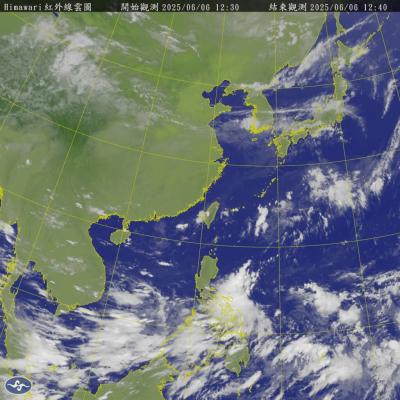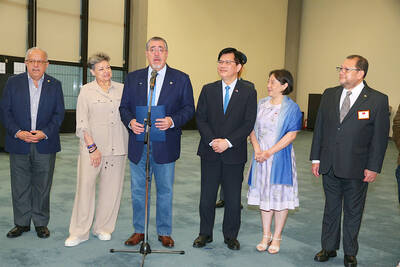For 57-year-old Yu Shyi-kun, the transition from a young follower of Kuo Yu-hsin (
Growing up in a typical farming family in the 1950s, Yu had no choice but to drop out of school at age 14 after his ailing father passed away.
Yu returned to school at the age of 19, working as a farmer and a salesman over the next eight years to support his education. During this period, Yu was deeply inspired by Taiwanese democratic pioneer Kuo.
When Kuo unexpectedly failed to win in the 1975 legislative polls, Yu and Kuo's other young followers became determined to fight for a more democratic and freer society by taking part themselves in politics.
In 1977, the 29-year-old Yu decided to run for a seat in the Taiwan Provincial Assembly but was convinced that another dangwai activist and an Ilan native, Lin I-hsiung (
Lin was elected with more than 73,000 votes.
Yu's modesty and willingness to consider the overall picture was recognized by most dangwai people, who later became key DPP figures.
Yu went on to serve two terms in the Taiwan Provincial Assembly and served two terms (eight-year) as Ilan County commissioner.
He has also served as vice premier, Presidential Office secretary-general and DPP Central Standing Committee member -- a resume that would serve him in good stead as DPP chairman.
One of example of his courage and willingness to help the DPP government was his decision to resign as vice premier in the summer of 2001, to take responsibility for the drowning of four workers in the Pachang Creek disaster.
However, Yu's decision to seek the chairmanship has been criticized by several senior DPP figures, including Lin, who was chairman from June 1998 to July 2000.
Lin published an open letter yesterday outlining his opposition to Yu's candidacy.
He said Yu should not run because he has already served as a top government official.
Lin hinted that Yu, as a key figure in the party, should have engaged in self-reflection rather than seeking a higher position out of personal interests.
Lin believes that the DPP, in the wake of its defeat in the Dec. 3 local elections, needs someone who is detached, but has a lot of prestige, and who can reform the party.
Yu, however, has been warmly welcomed by loyal party supporters in southern Taiwan, the so-called "deep greeners," because of his unsophisticated image.
"Based on my observation, DPP supporters in the south are pretty much in favor of Yu, whose background is similar to theirs," Chao Wen-nan (
Chao said Yu's image as of native Taiwanese would be an excellent distinction from KMT Chairman Ma Ying-jeou (
"Most DPP supporters in the south are looking forward to party reform conducted by a person who knows Taiwan well," Chao said.
Chao said Lin is a respected figure in the party but that this time he seemed to provoke disagreement in the south.
"I don't think Lin's criticism will have any impact here. I predict that Yu will gain overwhelming support in the south in the chairman election," Chao said.
Most supporters believe that Yu's experience will help the party find its footing.
Some believe that if Yu turns in an excellent performance as DPP chairman, it will help position him to be the DPP's candidate for the 2008 poll.

Greenpeace yesterday said that it is to appeal a decision last month by the Taipei High Administrative Court to dismiss its 2021 lawsuit against the Ministry of Economic Affairs over “loose” regulations governing major corporate electricity consumers. The climate-related lawsuit — the first of its kind in Taiwan — sought to require the government to enforce higher green energy thresholds on major corporations to reduce emissions in light of climate change and an uptick in extreme weather. The suit, filed by Greenpeace East Asia, the Environmental Jurists Association and four individual plaintiffs, was dismissed on May 8 following four years of litigation. The

STAY AWAY: An official said people should avoid disturbing snakes, as most do not actively attack humans, but would react defensively if threatened Taitung County authorities yesterday urged the public to stay vigilant and avoid disturbing snakes in the wild, following five reported snakebite cases in the county so far this year. Taitung County Fire Department secretary Lin Chien-cheng (林建誠) said two of the cases were in Donghe Township (東河) and involved the Taiwan habus, one person was bit by a Chinese pit viper near the South Link Railway and the remaining two were caused by unidentified snakes. He advised residents near fields to be cautious of snakes hiding in shady indoor areas, especially when entering or leaving their homes at night. In case of a

A tropical disturbance off the southeastern coast of the Philippines might become the first typhoon of the western Pacific typhoon season, the Central Weather Administration (CWA) said. The system lacks a visible center and how it would develop is only likely to become clear on Sunday or Monday, the CWA said, adding that it was not yet possible to forecast the potential typhoon's effect on Taiwan. The American Meteorological Society defines a tropical disturbance as a system made up of showers and thunderstorms that lasts for at least 24 hours and does not have closed wind circulation.

DIPLOMACY: It is Guatemalan President Bernardo Arevalo’s first visit to Taiwan since he took office last year, while Eswatini’s foreign minister is also paying a visit A delegation led by Guatemalan President Bernardo Arevalo arrived in Taiwan yesterday afternoon and is to visit President William Lai (賴清德) today. The delegation arrived at Taiwan Taoyuan International Airport at 4:55pm, and was greeted by Minister of Foreign Affairs Lin Chia-lung (林佳龍). It is Arevalo’s first trip to Taiwan since he took office last year, and following the visit, he is to travel to Japan to celebrate the 90th anniversary of diplomatic relations between the two countries. Arevalo said at the airport that he is very glad to make the visit to Taiwan, adding that he brings an important message of responsibility